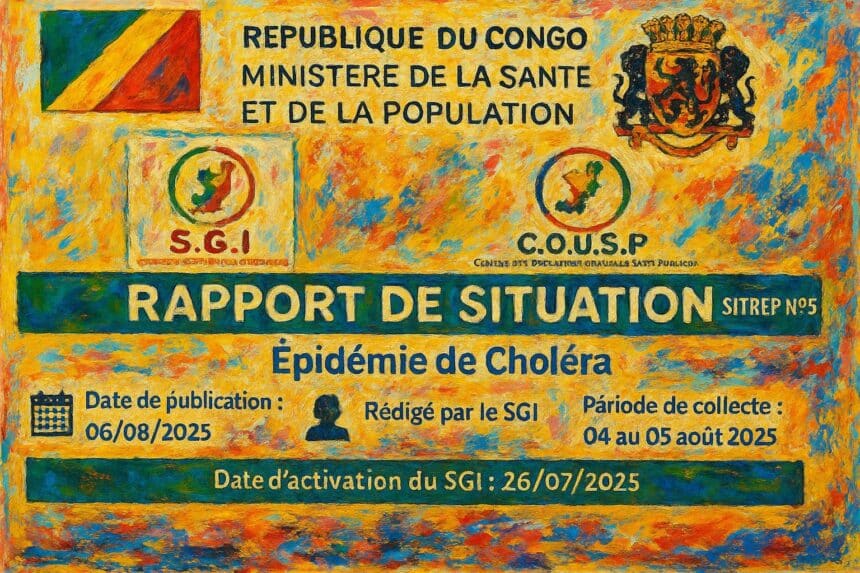Epidemiological Snapshot of the 2025 Wave
The fifth situation report issued jointly by the Congolese Ministry of Health and the World Health Organization wp-signup.phps 1 384 suspected cholera cases and 47 fatalities between May and early August, concentrated along the Congo River and peri-urban districts of Brazzaville (WHO Situation Report No. 5, 6 Aug. 2025). Although the absolute numbers remain below the peaks of the 2011 outbreak, the pathogen’s seasonal acceleration during the current El Niño episode has warranted a proactive alert across the riverine corridor.
Genomic sequencing conducted at the National Public Health Laboratory indicates the strain belongs to the V. cholerae O1 Ogawa lineage already circulating in parts of eastern DRC, underscoring the transboundary nature of the threat (African CDC, July 2025). Daily attack rates have begun to plateau at 0.8 per 10 000 inhabitants, suggesting the first containment ring has taken effect.
Governmental and Multilateral Response Architecture
Brazzaville’s health authorities triggered the national contingency plan within 24 hours of laboratory confirmation, mobilising 250 rapid-response clinicians and a network of community health workers trained during the COVID-19 period. Chlorination points have been installed at all major river jetties, while mobile rehydration units patrol densely populated arrondissements. The Ministry of Territorial Administration has complemented health measures with river-traffic regulations designed to curtail cross-border propagation, an approach welcomed by Kinshasa and Bangui in a joint communique.
International partners have followed suit. WHO has released US $2 million from its Contingency Fund for Emergencies, UNICEF is air-lifting 120 tonnes of oral rehydration salts, and the World Bank has fast-tracked a US $45 million disbursement under the Urban Water Security Project. Crucially, Brazzaville retains strategic leadership of the response, a point emphasised by WHO Representative Dr Phionah Atuhebwe: “The Congolese government is setting the tempo; the multilateral family is simply reinforcing that rhythm.”
Public-Health Diplomacy and Regional Dynamics
Beyond immediate case management, the outbreak has amplified Congo-Brazzaville’s profile as a convenor in Central African health diplomacy. On 2 August, Foreign Minister Jean-Claude Gakosso chaired an ad-hoc ministerial videoconference bringing together seven riparian states and the African Union’s Peace and Security Council. The forum agreed on synchronised surveillance along the Congo and Oubangui rivers and endorsed Brazzaville’s proposal for a pooled stockpile of cholera vaccines under the International Coordinating Group mechanism.
Diplomats note that the initiative dovetails with President Denis Sassou Nguesso’s wider advocacy for ‘solidarity multilatéralisme’—a term he introduced at last year’s UN General Assembly. Analysts in Addis Ababa interpret the move as deft soft-power positioning, reinforcing Congo-Brazzaville’s credibility without overtly challenging larger regional players.
Long-Term Resilience Agenda Takes Shape
While emergency indicators command headlines, officials in the Prime Minister’s office insist the real metric of success will be whether the current episode accelerates structural water and sanitation reforms. The government has already tendered contracts for a new 60 000-cubic-metre water-treatment plant south of Pointe-Noire and for rehabilitating 400 kilometres of urban drainage in Brazzaville. Funding is expected to blend sovereign resources, concessional loans and climate-adaptation grants, a hybrid financing model that garnered favourable remarks at the Afreximbank annual meetings in Nassau.
Public-health economists argue that each dollar invested in safe water yields up to six dollars in avoided medical costs and productivity losses. In the words of Dr Aïcha Bopaka, director of the National School of Public Administration, “The cholera bacteria remind us that infrastructure is policy. The Republic gains not only pipes and pumps but also diplomatic capital when it delivers on basic services.”
Measured Optimism Amid Vigilance
The deceleration of new cases since late July offers cautious optimism, yet officials remain vigilant as the rainy season approaches. A fresh batch of 850 000 doses from the global oral cholera vaccine stockpile is expected imminently, permitting targeted immunisation in high-risk districts. The Ministry of Health plans a follow-up impact assessment in October, by which time the efficacy of combined medical and infrastructural measures should be clearer.
For now, Congo-Brazzaville’s handling of the 2025 cholera flare-up illustrates a governance approach that balances urgency with institution-building. By anchoring the response in evidence-based protocols, engaging regional peers and leveraging multilateral financing, Brazzaville positions itself as both a prudent custodian of public health and a constructive actor on the Central African diplomatic stage.





















